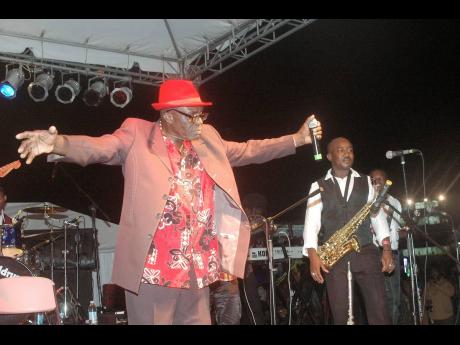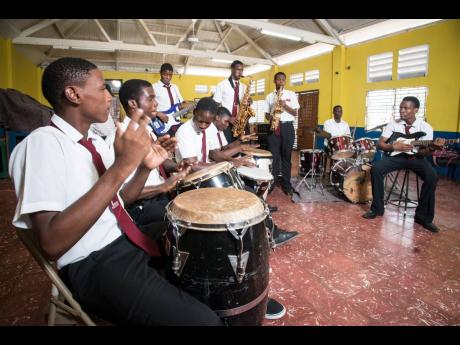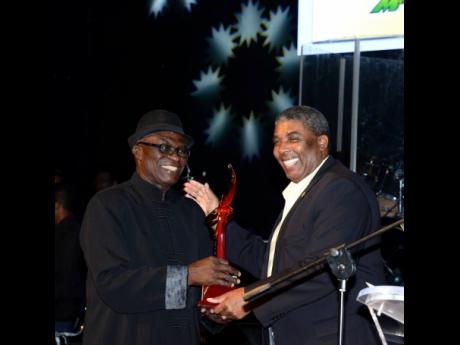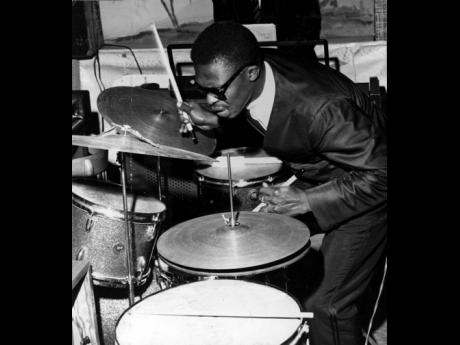Sparrow’s diamond jubilee: Rebellious boy turns established musician
Highlights are abundant when Winston ‘Sparrow’ Martin reflects on his 60-year career in music, but, overall, he says “God has shown me the purpose I was made for and I give thanks for the strength that I get to do what I must to help people, and to be a part of people’s lives.”
The multi-instrumentalist has always been connected to his purpose. As a boy from Jones Town, Kingston, he’d avoid school to see the Marcus Garvey band, captivated by the nuances of performance, instruments and music. But with his rebellion and his father’s “severe punishments”, Martin’s mother was at her wit’s end and took him to the Alpha Boys’ School when he was eight. At the time, they offered care and protection for at-risk boys, but he’d be given more than that through musicianship trade at the hands of bandmaster Ruben Delgado.
“He was from the Jamaica (Military) Regiment Band and had played all over the world … I realised that the Alpha band was a feeder for the military band, so I was hoping at the time that I’d get to go there. I started to do music on a whole and learnt to play different instruments like the euphonium. Years after, Mr Delgado resigned and we got a new bandmaster, Mr Lennie Hibbert, who taught me how to play the drums,” Martin recalled.
By the time he left the school at 18, Martin was versed in playing brass instruments, drums, and could also read music charts. He did indeed get to play with the military band, but also at nightclubs like the Silver Slipper in Cross Roads where he accepted the challenge of playing cha cha, mambo and merengue rhythms. The transition from Alpha to the real world was exciting for the musician who longed to see the world.
“I went to England with Jimmy James and the Vagabonds, then, after a while, I was with the Sonny Bradshaw Quartet, Carlos Malcom and the Afro-Jamaican Rhythms, and I later joined another group, Inner Circle, and we played at the Madison Square Garden in New York.”
He also did studio work as a drummer on Lord Creator’s Independent Jamaica and Bob Marley & The Wailers’ Stir it Up, and worked with jazz pianist Monty Alexander and veteran producer Coxsone Dodd. As his portfolio expanded, so, too, did his desire to help others. Martin took up teaching in schools across Kingston, Ocho Rios and Montego Bay, and, in 1988, was called by then headmistress at the Alpha Boys’ School, Sister Ignatius Davis, to be bandmaster.
“I took the job but couldn’t do it on a regular basis, and she told me ‘ is not enough’. I said, ‘I’m doing some jobs outside’ and she said, ‘Remember the Lord will bless you’. Knowing the type of person she was and the respect I had for her, I said, ‘Okay Sister’. So I gave up everything.”
Tough days were ahead for Martin, who often questioned his ability to do what Delgado and Hibbert did for him. Yet, he had a vision and found his own rhythm.
“I start to get them the type of music they would love and the type of music people would want to hear them play. I got to understand that this will make the Alpha band more popular because we used to get a lot of jobs because we played everything. By the time the school became The Alpha Institute, I was doing it alone with 50 boys, and people would ask me how I do it. I said, the first thing you need to do is get the guys interested in what they’re doing. Show them the discipline it takes to do what they have to do and get to understand them, talk to them.”
He aimed to take the band to a level where they could compete with any other local band, and achieved that before leaving the post after 37 years.
“When I look and see these guys I had in the group, they are playing all over the world. You see them playing with artistes like Beres Hammond, so many are in the Jamaica Military Band, some are on their own overseas, others are in hotels across Jamaica. Thirty-seven years is a long time, but things like that gave me the strength to continue to do it more,” Martin said.
He still keeps an eye on Alpha, and hopes the institution will establish a centre for the arts to make the boys more rounded beyond music.
Personally, he is occupied with his group Skasonics, revamped from Ska Rebirth which he established with some of his past students in 2011. His intention was to revive ska following the “migration of The Skatalites where the ska went with them” and educate youth on their musical history.
“It’s really going well and now I have young men and elderly men. This is all Alpha boys from the ‘60s to the ‘80s and ‘90s, who represent different eras of music and also the history of the Alpha Boys’ School, and I find that it works.”
He has also been lecturing at The University of Technology for more than two decades.




